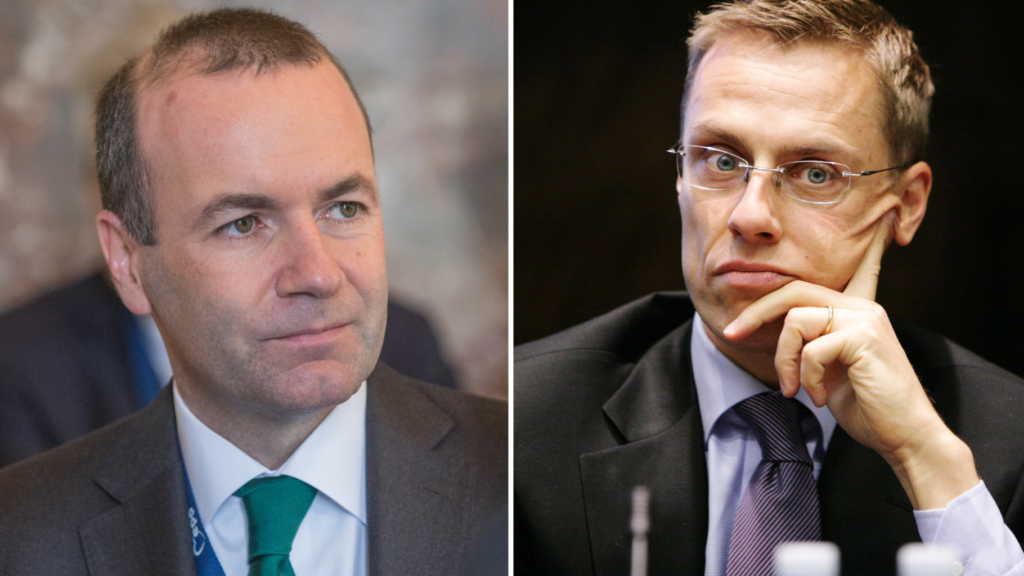In the name of European values
EPP’s Spitzenkandidat vote on 8 November

Source: Wikimedia Commons
In a week’s time, on 8 November, delegates from the European Parliament’s centre-right European People’s Party (EPP) will choose their lead candidate for the Commission presidency during the group’s party congress in Helsinki – a vote that is likely to decide the whole Parliament’s nominee for the most influential position in the EU for the next five years.
And the contenders could hardly be more different. “He brings almost nothing to mind“, said an unnamed German journalist when asked to describe the centre-right EPP group’s frontrunner Manfred Weber for a profile published by the Finnish Helsingin Sanomat newspaper last week. The EPP group leader and a former member of the Bavarian Landstag, whose website emphasises his Christian values as a basis for political action, has aligned himself with the group’s law-and-order wing supported by the likes of the Austrian Chancellor Sebastian Kurz, Hungarian Prime Minister Viktor Orbán, and Italian Bunga Bunga party organiser Silvio Berlusconi. This platform, like his public profile (described as “grey in a good way”), stands in stark contrast to his Spitzenkandidat opponent, the liberal cosmopolite Alexander Stubb.
Mr Stubb, Vice-President of the European Investment Bank (EIB) and the former Prime Minister of Finland, has so far been the more principled voice in his unequivocal support for the EU’s core values during a campaign tour of the continent, saying he has “zero-tolerance” for the illiberal agenda and calling for Fidesz to be expelled from the EPP if the party fails to commit to the EU’s core values and principles. Representing the group’s left-flank, the “Nordic pragmatist” would also be better positioned for pro-integration “grand coalition” support consisting of centre-left socialists, liberal centrists (much depends on Macron’s plans), and perhaps even the greens alongside the centre-right.
Nonetheless, Stubb is fighting an uphill battle. In addition to competing against a candidate who has already secured the support of all of the member state leaders belonging to the EPP (eight) and the EP President Antonio Tajani, the campaign process has effectively been turned into one of backroom politics due to Team Weber’s refusals to take part in debates between the two candidates. This has successfully eliminated an element of Stubb’s campaign, which relies heavily on his charisma and willingness to stand in the spotlight to gain visibility and rally support. In this light it comes as no surprise that Stubb, who has so far managed to formally secure support only from the Nordic and Baltic centre-right leaders, has repeatedly (but in vain) tried to press for the pair to engage in as many public debates as possible over the past month. Banking on home ground advantage in next week’s secret ballot, Stubb nevertheless hopes his open campaign will be enough to steal a majority of the 758 voting delegates, despite Weber’s status as the EPP establishment’s favourite.
Beyond the EPP’s political direction, the vote has the potential to shift the political compass also within the wider EU machinery. For his winning coalition, Weber’s platform aligns him for a possible conservative-nationalist alliance to select him as the Parliament’s candidate for the Commission presidency. Despite the strategy’s usefulness in short-term politicking, however, his ambivalence about Hungary – voting to initiate disciplinary process under Article 7 but supporting Fidesz’s EPP membership – and conciliatory attitude towards political figures such as Italy’s Matteo Salvini risk encouraging European politics further down a trajectory where illiberalism and extreme right nationalists are further legitimised at the centre-right’s expense. It is a well-calculated election tactic considering that the EP’s traditional balance of power is expected to weaken in the face of increased fragmentation after the European elections and because the other pro-integration centrist groups (S&D and ALDE) are increasingly unenthusiastic about the process which essentially grants the EPP the ability to dictate the Parliament’s lead candidate, but begs the question how valuable are the values set out in Article 2 TEU when put against securing positions of political power.
And with European democracy in desperate need of open and clear political debate, the next Commission will have to be actively in charge of the EU’s defence of its liberal core values. Ending rule of law backsliding within the Union is of particular importance, which cannot be done without stronger enforcement of common principles as set out by the treaties. In this light, assuming that the informal and unstable Spitzenkandidat system disliked by many national governments holds beyond May, the EPP must now decide whether the nomination of the next leader of the “Guardian of the Treaties” should rely on those who regularly test its limits.
